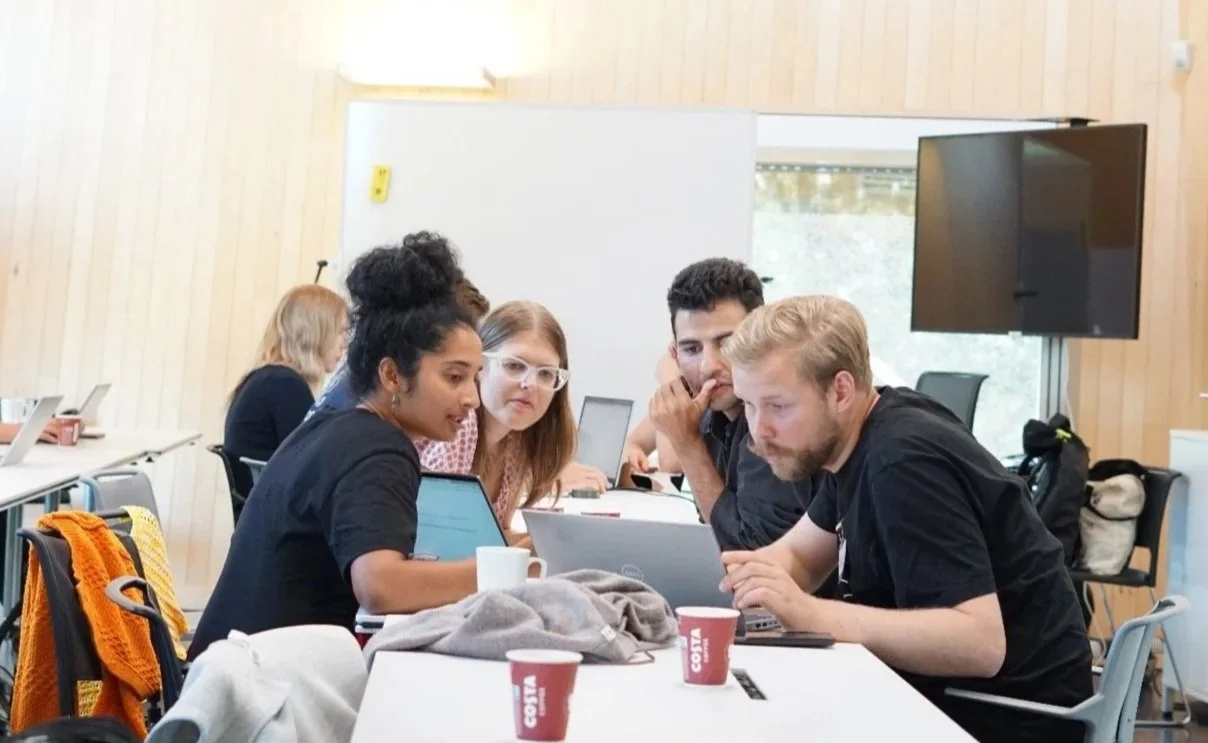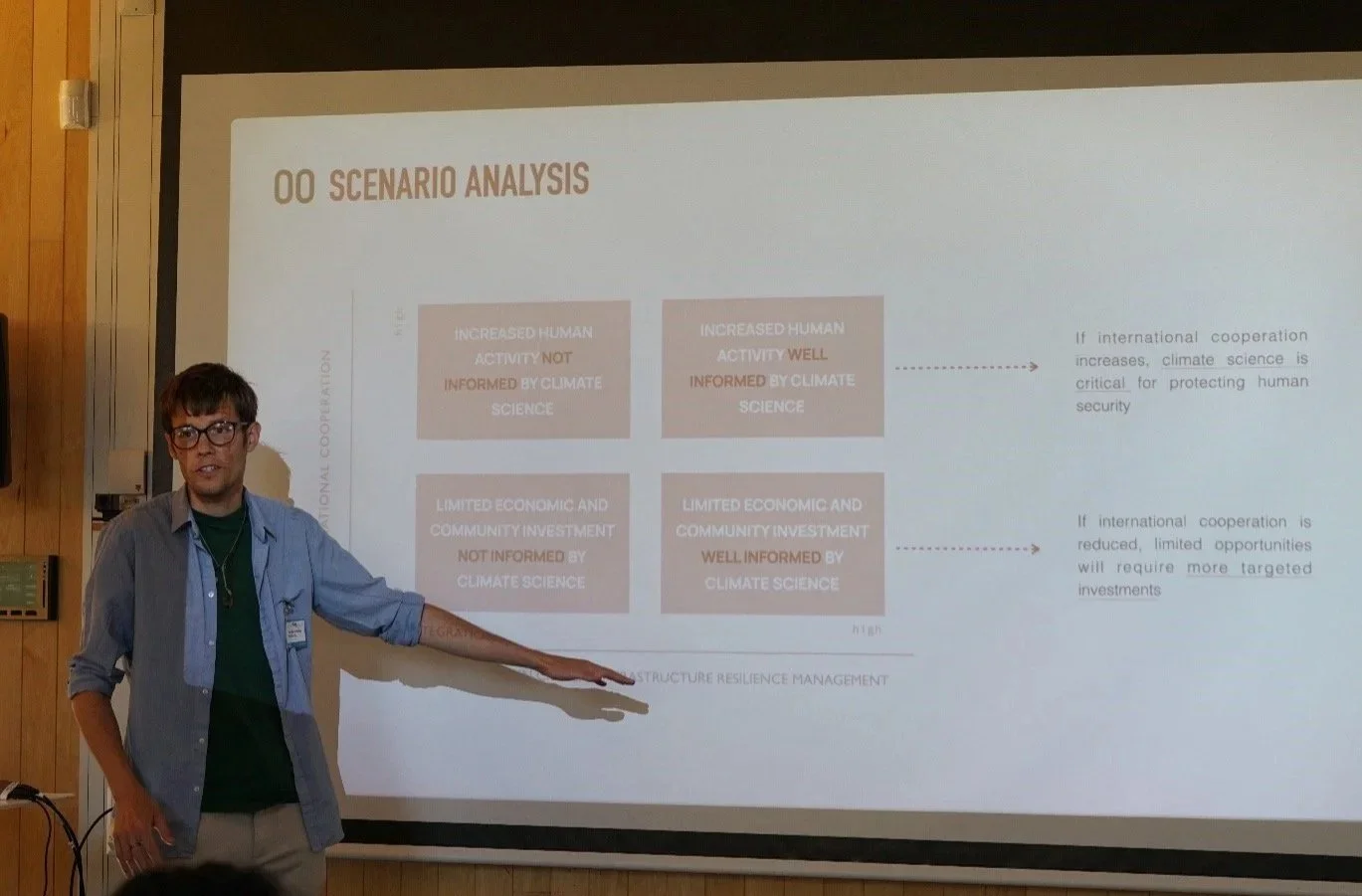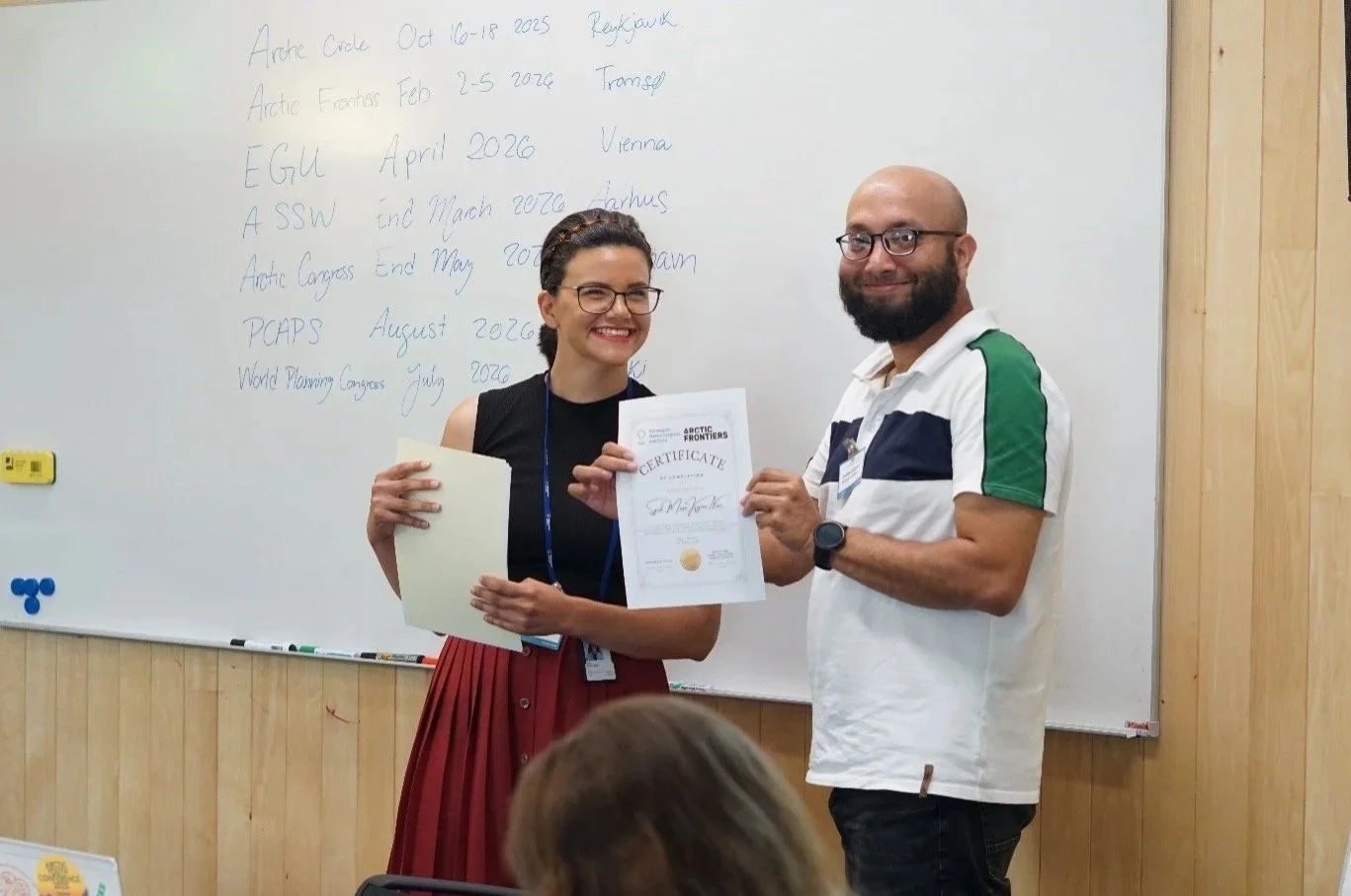CCCI PhD Summer School 2025: The importance of applied education to address rapid changes in the Arctic
From August 11 to 15, 16 students from Norway, Sweden and Finland met in Oslo for the NordForsk-funded Scenario Analyses Regarding Climate Change Hazards and Critical Infrastructure in the Arctic (CCCI) PhD summer school. This was the second edition of the CCCI PhD summer school and this year, it was organized by the Norwegian Meteorological Institute in collaboration with Arctic Frontiers via the URSA MAJOR project. The CCCI PhD summer school centred on providing an opportunity for students to develop scenario analyses and risk management strategies for extreme climate change-related hazards, focusing on their impacts on critical infrastructure and vital societal functions in the Nordic Arctic region. The CCCI PhD summer school was hosted by Dina Abdel-Fattah, PCAPS’ ICO Manager.
Group photo from the 2025 CCCI PhD summer school. Photo courtesy of Arctic Frontiers.
The CCCI PhD students came from a wide range of backgrounds covering philosophy, engineering, social sciences and natural sciences. They were accompanied by a multidisciplinary lecturer team from the: Norwegian Meteorological Institute, University of Lapland, Lund University, UiT - The Arctic University of Norway, Finnmark Hospital Trust, Arctic Monitoring and Assessment Program Working Group of the Arctic (AMAP), Norwegian Water Resources and Energy Directorate, and the Norwegian Geotechnical Institute. In addition, Julia Morales-Aguirre from Arctic Frontiers co-organised the CCCI PhD summer school this year with Dina, helping to merge current, policy-oriented perspectives into the curriculum.
The goal of the PhD summer school was for the PhD students to learn about how climate hazards are evolving in the Arctic and what impacts these are having on critical societal functions. The second edition of the CCCI PhD summer built upon on the work established during the previous edition, but with a greater focus on providing students with an opportunity to hear first-hand perspectives from practitioners and scientists about their need for, and use of, scientific information in hazard prevention and management in the Arctic. This proved to be both a welcomed, and useful, opportunity for the PhD students, and highlighted PCAPS focus on both interdisciplinary research but also research to operations.
“The summer school expanded my worldview by connecting me with researchers from diverse fields and by engaging with powerful more-than-humans in the context of climate risks. Among them, glaciers and permafrost stood out as especially influential. It opened a space to imagine what it means not only to respond to what they do but to think with them.”
Interdisciplinary active learning
One of the main focuses of the CCCI PhD summer school was for the students to work in multidisciplinary groups to develop interdisciplinary scenario analyses and policy briefs. Despite the short time together, the students were able to delve into their topics and produce interesting and relevant presentations.
Group work during the 2025 CCCI PhD summer school. Photo credits: Julia Morales-Aguirre
The first group focused on wildfires as a threat notably to energy and telecommunications infrastructure in the Arctic regions of Norway, Sweden, and Finland, illustrating the devastating effects to communities wildfires can pose to the Arctic, based on wildfire events in recent years. Wildfires have gained much attention throughout the Arctic community since the raging wildfires in Northern Russia in 2020-2021 and Northern Canada in 2023, with the Norwegian Chairship of the Arctic Council (2023-2025) establishing the Wildland Fires Initiative. The students therefore presented that energy infrastructure in the Arctic should be locally led to develop redundancies in case of an emergency.
One group did not tackle hazards that directly stem from extreme weather, but rather, presented risks from the increase in warm spells in the winter. The group dove into the increased risks on road systems and mobility presented by increasingly prevalent thaw and refreeze cycles. The international cooperation needed to address cascading consequences was exemplified by a scenario along the E8 highway linking Northern Norway and Finland which often suffers from significant delays due to winter accidents brought on by icy conditions. Their policy brief addressed practical solutions to prevent accidents at the outset and ensure safety for those who run into trouble while on the road.
The next group wished to focus their groupwork on effective methods to share best practices between the Nordics and other Arctic communities. Their policy brief therefore focused on an improved monitoring system for landslides in Greenland. Landslides are of increasing concern in the Arctic as instability of the land is triggered by various processes in a warming climate. The Greenlandic coast is known for its steep fjords and mountains and therefore is particularly vulnerable towards landslides. They considered the risk posed to airports, which are a crucial critical infrastructure to many small communities in Greenland given the sparse road system. They showed that there were potential threats in Kangerlussuaq which could have important ramifications on people and the economy.
Interestingly, the last group tackled the question of what is considered critical infrastructure by positing that Arctic research stations are critical to society. Research stations provide important scientific data, foster international collaboration, and provide timeseries of changes in the Arctic. However, like much infrastructure across the region, they are increasingly vulnerable to land-based hazards. They thus called on additional space capabilities to maintain data access, innovation in mobile research stations, and increased integration of research stations within local and diplomatic institutions. Much like their own multinational, multidisciplinary group, the efforts they wished to see were rooted in collaboration across both sectors and nations.
Jason Eric Bunderson, CCCI PhD student from Nord University, presenting about his group’s work. Photo credit: Julia Morales-Aguirre
New perspectives gained
The final day of the PhD summer school was one focused on reflection. The students admitted that as their research became more specialized, it was rare to be able to work with students outside their field. The group thought about the usefulness of having a broad network for interdisciplinary research. Especially in the case where they were not an expert on something which came up in their work, such a network would be very beneficial, since they could know someone who might be able to help them. They therefore appreciated that the CCCI PhD summer school allowed them to converse with academics well outside their bubble.
However, this did not come without its difficulties. All the students – and lecturers – agreed that many terms have different meanings depending on one’s field and the students experienced this firsthand in their group work. They often had to take time to first come to a common understanding before moving forward with their research. They also found that the methodologies employed within their disciplines and their understandings of how knowledge is generated sometimes did not align with other disciplines - this demanded even deeper conversations. However, by taking part in these complex discussions, they felt they were better able to capture the cascading effects of climate hazards on communities in the Arctic.
Lastly, the CCCI PhD summer school also raised the normative question: Should scientific work aim to influence policy? The students mentioned that they had largely believed the answer to be no – that science and research which fed into policy was inherently negative. However, the students also found that it was interesting that the CCCI PhD summer school gave them the opportunity to be at the giving-end, rather than on receiving-end, of policy, which opened many students’ eyes to the need for closer collaboration between scientists and policymakers. The groups reflected that science-for-policy work could be one way to for scientists to have a more direct role in addressing issues that scientists identify as risks to society.
New network formed
The CCCI PhD summer school fostered many personal and professional connections: the group is already brainstorming when they would meet next, and how they could work together in the coming years of their studies!
We look forward to following – and hopefully sharing – updates on forthcoming synergies between the 2025 CCCI PhD summer school cohort and PCAPS.
Two CCCI PhD students pleased with their week: Syed Musa Nuri (University of Lapland, middle) receiving his Certificate of Completion from Dina Abdel-Fattah (left). Astrid Bragstad Gjelsvik (University of Oslo, right) enjoying a break in the Norwegian Meteorological Institute’s garden.






